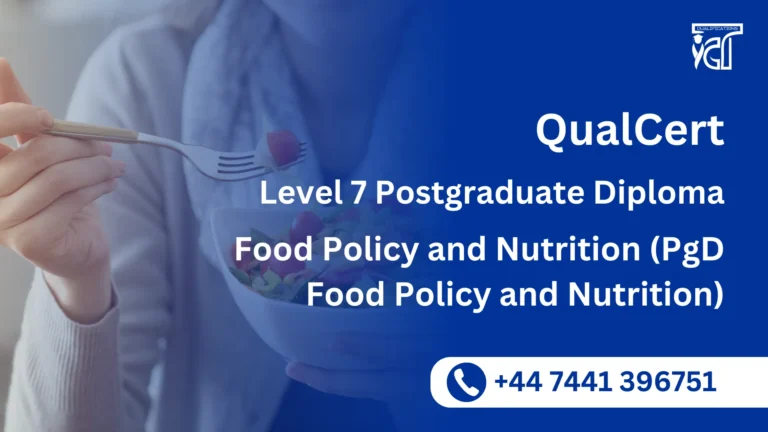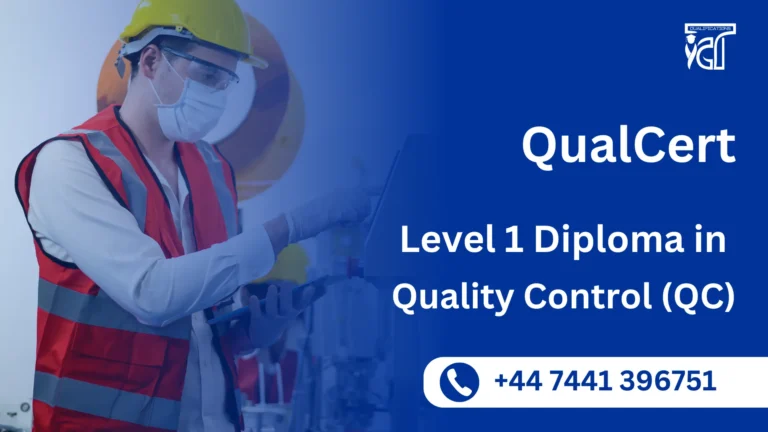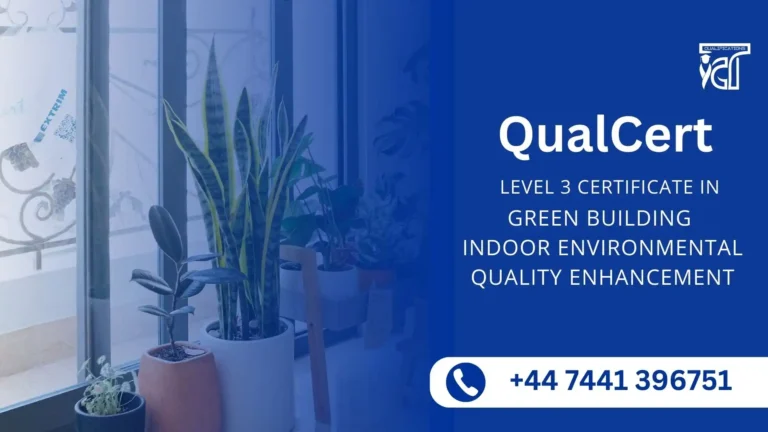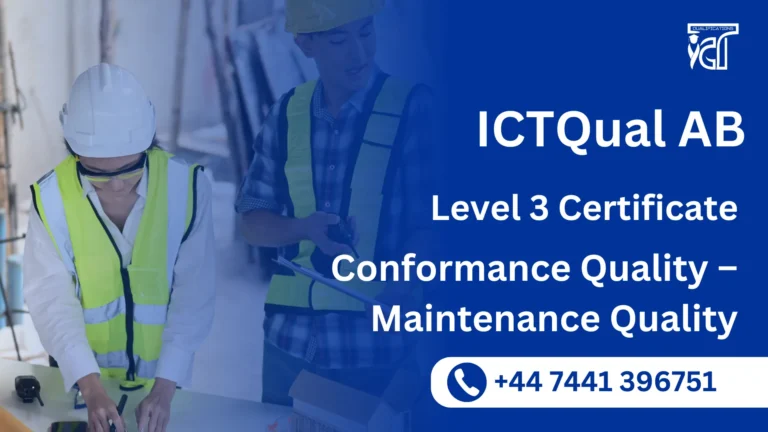In today’s competitive global marketplace, maintaining high standards of product and service quality is more crucial than ever. Quality control (QC) professionals play a key role in ensuring consistency, reliability, and customer satisfaction across all industries. The QualCert Level 3 Certificate in Quality Control (QC) is a comprehensive, professionally recognized qualification designed to equip individuals with the practical skills and technical knowledge needed to excel in quality assurance roles.
Whether you’re beginning a career in quality management or looking to formalize your on-the-job experience, this certificate offers a structured, industry-relevant pathway into one of the most vital areas of business operations.
The QualCert Level 3 Certificate in Quality Control provides learners with a deep understanding of quality assurance principles, inspection procedures, and regulatory compliance. This Ofqual-recognised qualification is fully assignment-based—allowing learners to demonstrate their competency through practical assessments and workplace scenarios rather than traditional exams.
Delivered through flexible learning methods, this course is suitable for full-time professionals, career changers, and individuals seeking to upskill for new opportunities in manufacturing, engineering, pharmaceuticals, food production, construction, and more.
The QualCert Level 3 Certificate in Quality Control (QC) is a practical, career-driven qualification designed to meet the growing demand for skilled quality professionals in today’s dynamic job market. With its flexible format, assignment-based assessment, and globally recognised accreditation, this course is the perfect starting point for building a successful career in quality assurance.
Start your journey today and take the first step toward becoming a confident, certified quality control specialist.
QualCert Level 3 Certificate in Quality Control (QC)
This QualCert Level 3 Certificate in Quality Control (QC) course offers 20 Credits, requiring a Total Qualification Time (TQT) of 100 hours, including 70 Guided Learning Hours (GLH). It is designed for efficient and focused skill development in Quality Control (QC).
| Unit Ref# | Unit Title | Credit | GLH | TQT |
| QC01008 – 1 | Strategic Quality Management | 4 | 14 | 20 |
| QC01008 – 2 | Advanced Materials Testing | 4 | 14 | 20 |
| QC01008 – 3 | Lean Construction and Quality | 4 | 14 | 20 |
| QC01008 – 4 | Digital Tools in Quality Management | 4 | 14 | 20 |
| QC01008 – 5 | Failure Analysis and Corrective Actions | 4 | 14 | 20 |
GLH (Guided Learning Hours) and TQT (Total Qualification Time) are terms commonly used in vocational qualifications to help define the amount of time a learner is expected to spend on their studies.
1. GLH (Guided Learning Hours)
GLH refers to the number of hours a learner spends being directly taught, supervised, or supported during their course. This includes the time spent in activities such as:
- Classroom instruction
- Practical workshops
- One-on-one tutoring or mentoring sessions
- Online learning sessions with tutor support
In other words, GLH represents the time that learners are actively engaged with their instructors or learning activities.
2. TQT (Total Qualification Time)
TQT represents the total amount of time a learner is expected to invest in completing a qualification, including:
- GLH (Guided Learning Hours): Time spent on direct learning, as explained above.
- Self-Directed Learning: This includes time spent on independent study, research, assignment completion, preparation for exams, and any other work the learner does outside of direct teaching hours.
TQT is a broader measure that includes all the time required to achieve the qualification. It helps learners and employers understand the overall commitment required for the qualification.
Key Differences Between GLH and TQT:
- GLH focuses on direct learning with guidance or supervision.
- TQT includes GLH as well as independent study time and other learning-related activities.
Example:
If a qualification has a TQT of 600 hours and a GLH of 250 hours, it means the learner should spend 250 hours in direct learning (classroom, online, or tutor-led sessions) and 350 hours on independent study or research.
Upon successful completion of the Level 3 Certificate in Quality Control, participants will achieve the following learning outcomes:
1. Strategic Quality Management:
- Understand the key principles and concepts of strategic quality management.
- Learn how to develop and implement a quality management strategy aligned with organizational goals.
- Gain knowledge of quality management frameworks and methodologies (e.g., Total Quality Management, Six Sigma).
- Apply strategic decision-making to optimize quality performance and improve organizational outcomes.
- Evaluate the impact of strategic quality initiatives on overall business performance.
2. Advanced Materials Testing:
- Gain an in-depth understanding of the various methods and tools used for advanced materials testing.
- Learn how to select appropriate testing techniques based on material properties and industry requirements.
- Interpret and analyze test results to assess material performance and quality.
- Understand the importance of material testing in product design, development, and production.
- Develop skills in identifying material defects and ensuring compliance with quality standards.
3. Lean Construction and Quality:
- Understand the principles of Lean construction and how they relate to quality management.
- Learn how to eliminate waste and enhance value in construction projects while maintaining quality standards.
- Gain knowledge of Lean tools and techniques, such as value stream mapping and Kaizen, to improve construction quality.
- Learn how to integrate Lean practices into quality control processes for enhanced project outcomes.
- Evaluate the effectiveness of Lean construction methods in reducing cost and improving project quality.
4. Digital Tools in Quality Management:
- Gain proficiency in using digital tools and software for quality management (e.g., statistical analysis software, quality dashboards).
- Learn how to collect, analyze, and visualize quality data using digital platforms.
- Understand the role of digital tools in automating quality control processes and enhancing decision-making.
- Develop skills in using digital solutions for root cause analysis and continuous improvement initiatives.
- Explore emerging technologies, such as Artificial Intelligence and Machine Learning, in quality management.
5. Failure Analysis and Corrective Actions:
- Learn the principles and methodologies for conducting effective failure analysis in quality management.
- Gain an understanding of common failure modes and how to identify the root causes of quality issues.
- Develop skills in applying corrective actions to prevent recurrence of failures and improve product/process quality.
- Understand the importance of corrective and preventive actions (CAPA) in maintaining continuous quality improvement.
- Evaluate the effectiveness of corrective actions through monitoring and ongoing analysis.
Benefits of the QualCert Level 3 Certificate in Quality Control (QC)
The QualCert Level 3 Certificate in Quality Control offers a wide range of practical and career-focused benefits. Whether you’re new to the field or looking to formalize your experience, this Ofqual-regulated course equips you with the knowledge, skills, and confidence to succeed in the quality assurance industry.
1. Ofqual-Regulated and Internationally Recognised
This qualification meets UK national standards and is recognised across industries worldwide. It enhances your professional credibility and opens doors to career opportunities both locally and globally.
2. 100% Assignment-Based – No Exams
The course is fully assessment-based, allowing you to demonstrate your understanding through practical tasks and real-life workplace scenarios. Ideal for learners who prefer hands-on learning without the pressure of traditional exams.
3. Flexible, Career-Friendly Learning
Study online at your own pace, around your work or personal commitments. This makes it accessible for full-time professionals, shift workers, or those upskilling for career growth.
4. Industry-Relevant Skills and Knowledge
You’ll gain up-to-date knowledge of inspection procedures, documentation control, ISO standards, and quality improvement techniques—skills that are highly valued in sectors like manufacturing, pharmaceuticals, food production, and engineering.
5. Improve Job Performance and Employability
With formal training in quality control, you’ll be better equipped to contribute to your organization’s efficiency, product consistency, and regulatory compliance—making you an asset to any employer.
6. Enhanced Career Prospects
Graduates are well-positioned for roles such as Quality Control Technician, Quality Inspector, Production Supervisor, or Compliance Officer. The certificate also boosts your chances of internal promotions or cross-sector transitions.
7. Foundation for Advanced Qualifications
This course serves as a stepping stone to higher-level programs like Level 4/5 Diplomas in Quality Assurance, Lean Six Sigma Certification, or ISO Lead Auditor Training.
8. Supports Continuous Improvement Initiatives
You’ll be trained in root cause analysis, risk management, and quality tools (like CAPA and Kaizen), helping your organization improve efficiency, reduce waste, and meet quality standards.
9. Ideal for Career Changers and New Starters
Whether you’re transitioning into quality control from another field or starting your first role in the industry, this qualification provides a clear and supportive path into the profession.
By enrolling in the QualCert Level 3 Certificate in Quality Control, you’re investing in a future-proof skill set that is essential in today’s production-driven economy. It’s a smart, flexible, and impactful way to grow your career in quality assurance and operational excellence.
The Level 3 Certificate in Quality Control is ideally suited for a diverse range of individuals seeking to advance their careers and expertise in quality control and quality assurance. It is designed for:
- Experienced Quality Control Professionals: Quality control professionals with several years of experience who aspire to further specialize and excel in their roles.
- Quality Assurance Specialists: Quality assurance professionals looking to enhance their understanding of advanced quality control methodologies to complement their quality assurance expertise.
- Managers and Leaders: Managers and leaders responsible for overseeing quality control processes and teams within their organizations, seeking to enhance their leadership skills in quality management.
- Engineers and Scientists: Individuals with educational backgrounds in engineering
Entry Requirements
Register Now
Qualification Process
Qualification Process for the QualCert Level 3 Certificate in Quality Control (QC)
- Self-Assessment:
Begin by evaluating your eligibility to ensure you meet the qualification requirements, including work experience, knowledge, and language proficiency. - Registration:
Complete your registration by submitting the required documents, including a scanned copy of a valid ID, and paying the registration fee. - Induction:
An assessor will conduct an induction to confirm your eligibility for the course and explain the evidence requirements. If you do not meet the criteria, your registration will be canceled, and the fee will be refunded. - Assignmnets & Evidence Submission:
Provide all assignmnets and the necessary evidence based on the assessment criteria outlined in the course. If you are unsure of the required evidence, consult with the assessor for guidance on the type and nature of evidence needed. - Feedback and Revision:
The assessor will review your submitted evidence and provide feedback. Evidence that meets the criteria will be marked as “Criteria Met,” while any gaps will be identified. You will be asked to revise and resubmit if needed. - Competence Evidence:
Submit final evidence demonstrating that all learning outcomes have been met. This evidence will be marked as “Criteria Met” by the assessor once it is satisfactory. - Internal Quality Assurance (IQA):
The Internal Quality Assurance Verifier (IQA) will review your evidence to ensure consistency, quality, and compliance with standards. - External Verification:
The IQA will submit your portfolio to QualCert External Quality Assurance Verifiers (EQA) for final confirmation. The EQA may contact you directly to verify the authenticity of your evidence. - Certification:
Upon successful completion of all checks, QualCert will issue your official certificate, confirming that you have attained the QualCert Level 3 Certificate in Quality Control (QC).







